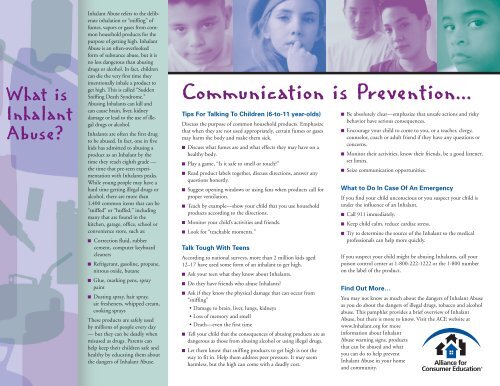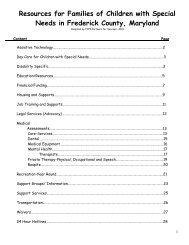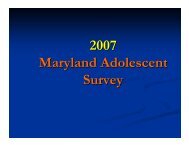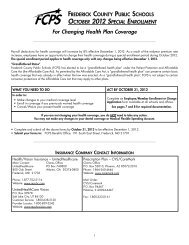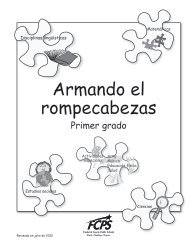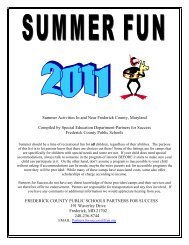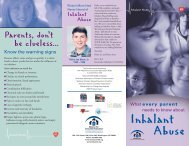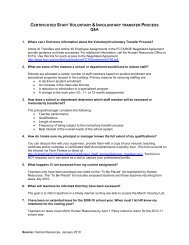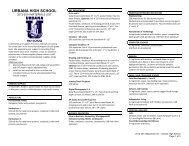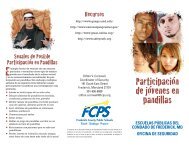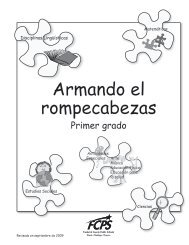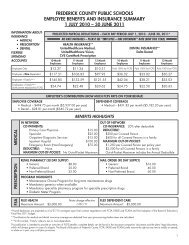You also want an ePaper? Increase the reach of your titles
YUMPU automatically turns print PDFs into web optimized ePapers that Google loves.
What is<br />
Inhalant<br />
Abuse?<br />
Inhalant Abuse refers to the deliberate<br />
inhalation or “sniffing” of<br />
fumes, vapors or gases from common<br />
household products for the<br />
purpose of getting high. Inhalant<br />
Abuse is an often-overlooked<br />
form of substance abuse, but it is<br />
no less dangerous than abusing<br />
drugs or alcohol. In fact, children<br />
can die the very first time they<br />
intentionally inhale a product to<br />
get high. This is called “Sudden<br />
Sniffing Death Syndrome.”<br />
Abusing <strong>Inhalants</strong> can kill and<br />
can cause brain, liver, kidney<br />
damage or lead to the use of illegal<br />
drugs or alcohol.<br />
<strong>Inhalants</strong> are often the first drug<br />
to be abused. In fact, one in five<br />
kids has admitted to abusing a<br />
product as an Inhalant by the<br />
time they reach eighth grade —<br />
the time that pre-teen experimentation<br />
with <strong>Inhalants</strong> peaks.<br />
While young people may have a<br />
hard time getting illegal drugs or<br />
alcohol, there are more than<br />
1,400 common items that can be<br />
“sniffed” or “huffed,” including<br />
many that are found in the<br />
kitchen, garage, office, school or<br />
convenience store, such as:<br />
■ Correction fluid, rubber<br />
cement, computer keyboard<br />
cleaners<br />
■ Refrigerant, gasoline, propane,<br />
nitrous oxide, butane<br />
■ Glue, marking pens, spray<br />
paint<br />
■ Dusting spray, hair spray,<br />
air fresheners, whipped cream,<br />
cooking sprays<br />
These products are safely used<br />
by millions of people every day<br />
— but they can be deadly when<br />
misused as drugs. Parents can<br />
help keep their children safe and<br />
healthy by educating them about<br />
the dangers of Inhalant Abuse.<br />
Communication is Prevention...<br />
Tips For Talking To Children (6-to-11 year-olds)<br />
Discuss the purpose of common household products. Emphasize<br />
that when they are not used appropriately, certain fumes or gases<br />
may harm the body and make them sick.<br />
■ Discuss what fumes are and what effects they may have on a<br />
healthy body.<br />
■ Play a game, “Is it safe to smell or touch?”<br />
■ Read product labels together, discuss directions, answer any<br />
questions honestly.<br />
■ Suggest opening windows or using fans when products call for<br />
proper ventilation.<br />
■ Teach by example—show your child that you use household<br />
products according to the directions.<br />
■ Monitor your child’s activities and friends.<br />
■ Look for “teachable moments.”<br />
Talk Tough With Teens<br />
According to national surveys, more than 2 million kids aged<br />
12–17 have used some form of an inhalant to get high.<br />
■ Ask your teen what they know about <strong>Inhalants</strong>.<br />
■ Do they have friends who abuse <strong>Inhalants</strong>?<br />
■ Ask if they know the physical damage that can occur from<br />
“sniffing”<br />
• Damage to brain, liver, lungs, kidneys<br />
• Loss of memory and smell<br />
• Death—even the first time<br />
■ Tell your child that the consequences of abusing products are as<br />
dangerous as those from abusing alcohol or using illegal drugs.<br />
■ Let them know that sniffing products to get high is not the<br />
way to fit in. Help them address peer pressure. It may seem<br />
harmless, but the high can come with a deadly cost.<br />
■ Be absolutely clear—emphasize that unsafe actions and risky<br />
behavior have serious consequences.<br />
■ Encourage your child to come to you, or a teacher, clergy,<br />
counselor, coach or adult friend if they have any questions or<br />
concerns.<br />
■ Monitor their activities, know their friends, be a good listener,<br />
set limits.<br />
■ Seize communication opportunities.<br />
What to Do In Case Of An Emergency<br />
If you find your child unconscious or you suspect your child is<br />
under the influence of an Inhalant,<br />
■ Call 911 immediately.<br />
■ Keep child calm, reduce cardiac stress.<br />
■ Try to determine the source of the Inhalant so the medical<br />
professionals can help more quickly.<br />
If you suspect your child might be abusing <strong>Inhalants</strong>, call your<br />
poison control center at 1-800-222-1222 or the 1-800 number<br />
on the label of the product.<br />
Find Out More…<br />
You may not know as much about the dangers of Inhalant Abuse<br />
as you do about the dangers of illegal drugs, tobacco and alcohol<br />
abuse. This pamphlet provides a brief overview of Inhalant<br />
Abuse, but there is more to know. Visit the ACE website at<br />
www.Inhalant.org for more<br />
information about Inhalant<br />
Abuse warning signs, products<br />
that can be abused and what<br />
you can do to help prevent<br />
Inhalant Abuse in your home<br />
and community.


